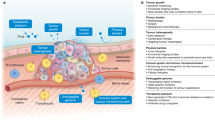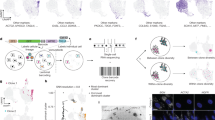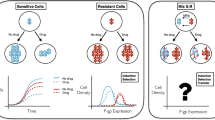Abstract
Cells of the methylene dimethanesulphonate-(MDMS)-resistant Yoshida sarcoma cell line contain a low molecular weight “resistance factor” which is present in the culture medium of these cells and may be utilized by MDMS-sensitive Yoshida sarcoma cells either by co-culturing the two cell lines or by culturing the MDMS-sensitive Yoshida cells in a medium containing 20% used medium of MDMS-resistant Yoshida cells or in the presence of dialysed medium from resistant cells. The “resistance factor” does not inactivate the drug itself or its metabolites, and it has no influence on the sensitivity of the cells if added after MDMS treatment. Twenty-four hours seems to be enough time for the transfer of the resistance factor, but its effect on whole populations decreases within 24 hours of ceasing the supply. The relationship between these findings and the known phenomena of metabolic co-operation are discussed.
This is a preview of subscription content, access via your institution
Access options
Subscribe to this journal
Receive 24 print issues and online access
$259.00 per year
only $10.79 per issue
Buy this article
- Purchase on Springer Link
- Instant access to full article PDF
Prices may be subject to local taxes which are calculated during checkout
Similar content being viewed by others
Rights and permissions
About this article
Cite this article
Szende, B., Fox, M. & Fox, B. A Transferable “Resistance Factor” from in vitro Cultured MDMS-Resistant Yoshida Sarcoma Cells. Br J Cancer 27, 245–252 (1973). https://doi.org/10.1038/bjc.1973.29
Issue Date:
DOI: https://doi.org/10.1038/bjc.1973.29



